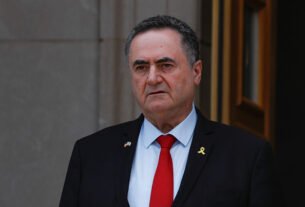The Irish Tánaiste (Foreign Minister) met virtually this week with United States Trade Representative Ambassador Jamieson Greer. The meeting on 26 August was held just as tensions emerged between Washington and Brussels over digital rights and the Ukraine war.
Following the meeting, Euractiv spoke with Fine Gael TD Colm Burke, representing the pharma-centric constituency of Cork North Central.
Ireland cautiously welcomed the EU-US Framework Agreement on Reciprocal, Fair and Balanced Trade, which sets a 15 per cent ceiling tariff on EU exports to the United States, including pharmaceuticals and semiconductors. The deal, published on 21 August, provides a reprieve for Irish exporters facing escalating trade barriers, although concerns remain over its broader implications.
“What the Agreement does is avoid a harmful tariff-escalation across the Atlantic and ensures continued access to American markets,” said Burke, “It provides stability and predictability for Irish exporters in an exceptional situation where the United States is imposing high tariffs on imports from countries around the world,” he told Euractiv.
Burke confirmed that the 15 per cent rate, in effect since 7 August, will apply to pharmaceuticals and semiconductors, protecting Irish firms from potential Section 232 tariffs. “This provides an important shield to Irish exporters that could have been subject to much larger tariffs pending the outcomes of Section 232 US investigations into these sectors.”
However, the deal’s scope remains limited. “Ireland’s aim now is to see what other carve-outs can be made in areas of interest for Irish exporters, including spirits and medical devices. We fully appreciate that there will be disappointment and deep concern in these sectors,” Burke said, adding that officials will “maintain very close contact with the Commission in the coming period as the full details of the agreement are worked through.”
Door still open for negotiations
Despite the finality of the headlines, the Joint Statement leaves room for future negotiations. “Importantly, the Joint Statement leaves the door open for negotiation of further tariff reductions in the future on products of strategic common interest,” Burke noted. “This is a framework agreement which gives us a first step to negotiate a more comprehensive and formal agreement with the US in the future.”
The Tánaiste’s meeting also addressed the implications for Northern Ireland and the all-island economy, though the Department of Foreign Affairs declined to comment on the UK’s role. Burke, however, reiterated Ireland’s position: “We fundamentally believe that tariffs are a negative policy tool. However, the certainty that these deals provide, along with Government action to improve competitiveness, will mitigate the impact of these tariffs.”
232 investigation nerves
Aside from the Irish government’s positive noises, Euractiv understands that some EU officials and industry leaders remain anxious about the potential use of Section 232 investigations, which could provide a fig leaf of justification to revisit the terms of any deal under the flag of national security concerns.
Adding gasoline to the warm embers of doubt, Axios reported that “Senior White House officials believe some European leaders are publicly supporting President Trump’s effort to end the war in Ukraine, while quietly trying to undo behind-the-scenes progress since the Alaska summit.”
That less than veiled disquiet came just days after Reuters reported that the US administration is “considering imposing sanctions on European Union or member state officials responsible for implementing the bloc’s landmark Digital Services Act.” This would be an unprecedented aggression.
Carve-outs in play
While EU and Irish negotiators will continue to seek pharma carve-outs as the deal is finalised, they must do so knowing they will be forced to swallow bitter pills to avoid serious policy disruption across the board. It remains difficult to see how pharma negotiations will be detached from digital demands and posturing over Ukraine.
As Sabine Weyand, Director-General for Trade and Economic Security in the European Commission, told Süddeutsche Zeitung (SZ Dossier), “If you didn’t hear me use the word ‘negotiation’ – that’s because it wasn’t one.”
Weyand’s description of the EU-US deal as a ‘strategic compromise’ has all the hallmarks of a hostage situation.
Pharma tariff truce averts worst-case scenario
Writing in an Atlantic Council editorial this week, Emma Nix, an assistant director with the Atlantic Council’s Europe Centre, said that while the agreement offers relief, the 15 per cent levy is expected to cost the EU industry up to $19bn annually.
In 2024, the EU exported €120bn in pharmaceuticals to the US, its largest export category by value. European firms are responding by stockpiling drugs stateside and investing in US manufacturing, potentially at the expense of their domestic footprint.
Nix noted that while the deal comes amid broader tensions over drug pricing, with Washington pushing for “Most Favored Nation” pricing and accusing Europe of regulatory free riding.
Pharma multinationals, including Eli Lilly, have begun adjusting European prices in response. Both sides face mounting pressure to secure resilient supply chains, as over 60 per cent of key pharmaceutical ingredients originate from India and China.
Nix points to the push for ‘friendshoring’, where, in the context of the US-EU trade deal, friendshoring is seen as a long-term solution to reduce dependency on non-aligned nations and to strengthen transatlantic cooperation in securing affordable, accessible medicines. It’s also a strategic response to rising tariffs and pricing pressures, aiming to balance economic interests with geopolitical stability.
In today’s political economy, it’s hard to know if my friend’s enemy is my enemy, or, like middle school, we’ll all be friends again by the end of the week. What is certain – uncertainty hurts investment, and this tariff merry-go-round will weaken pharma supply chain resilience.
(VA)





